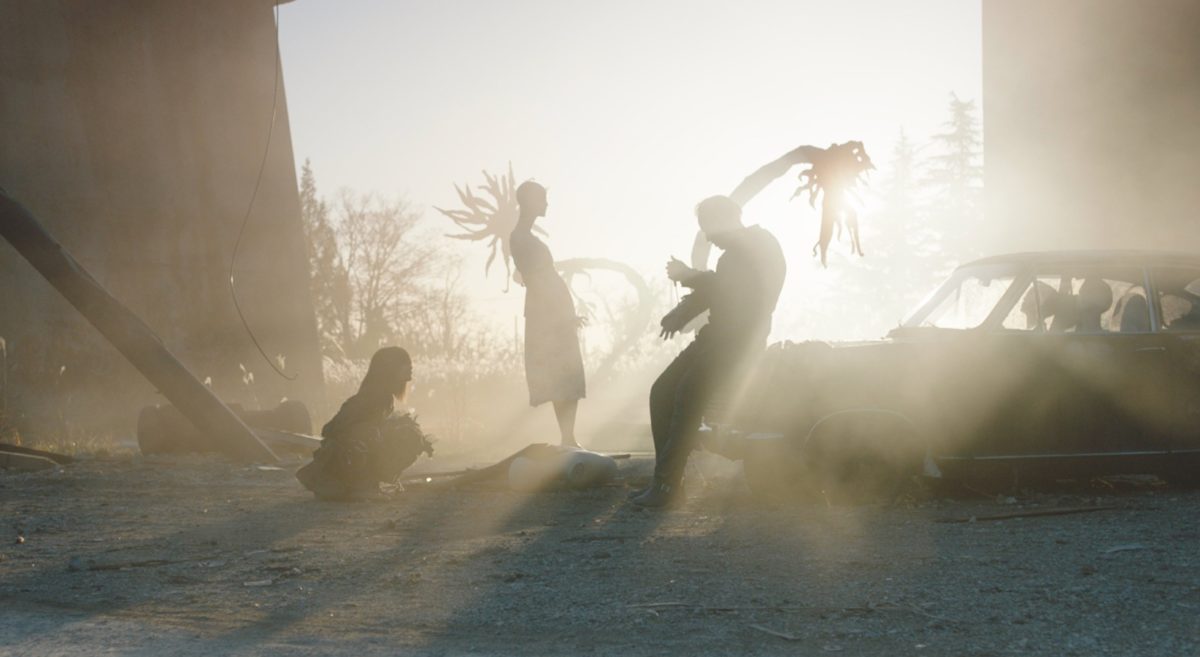The 57th directorial credit in his vast filmography, Sion Sono’s Prisoners of the Ghostland premieres at this year’s Sundance before his 56th, Red Post on Escher Street, plays Japan Society next month as part of the series “21st Century Japan: Films From 2001-2020.” Ghostland is Sono’s first English-language film and stars Nicolas Cage in a spaghetti western-cum-Western film, in the global sense. Cage plays Hero, a bank robber sprung from jail by Samurai Town’s wealthy warlord The Governor (Bill Moseley). He offers Hero his freedom in exchange for finding his missing granddaughter Bernice (Sofia Boutella). The plot owes much to John Carpenter’s Escape from L.A. and the prison of Ghostland looks transplanted from Sidney Lumet’s The Wiz, but the directorial execution is pure Sono.
We spoke with Sion Sono in advance of Prisoners of the Ghostland’s Sundance world premiere tonight. He talks about his heart attack and how it forced him to film Ghostland in Japan, Nicolas Cage’s claim that it’s his wildest movie, and Sono reveals he recently died and came back from the dead.

The Film Stage: Nicolas Cage said this is the wildest movie he’s ever made. Why do you think he said that?
Sion Sono: That’s still a mystery.
You do explode his testicles in the movie.
[Sion laughs.]
What’s your favorite Nicolas Cage performance?
Wild at Heart by David Lynch. He shows a true talent as an actor in that movie.
What inspired the design of the Ghostland?
When I received the script, and when we were proceeding with the project, we were considering shooting this in Mexico. For me, it was more of a spaghetti western type of classic Western film. We were proceeding with that but then I had a heart attack. At that point, it wasn’t quite possible for me to shoot outside of Japan. So Nic Cage and everyone else seemed to like the idea of shooting in Japan. So from that moment on, shooting this classic spaghetti western world in Japan, that gave me a lot of new ideas and opened the door for me to create something completely new. So it wasn’t that the idea or the inspiration came from somewhere, but it was all like the process of it. It was literally inspired by that whole process of making the movie.
Did your heart attack change the way you work and the way you see the world?
So, to tell you the truth, with the heart attack, I was literally dead for 60 seconds. I went to outer space, if you believe. So I experienced this totally unrealistic world and all these experiences gave me totally new inspirations, and now influence my filmmaking style.
What’s one example of something from your mystical experience that’s in this movie?
Those experiences change my perspective, but to tell you the truth, there’s no specific theme that I created or put into the movie. But on the other hand, that whole experience has changed me. For the entire process of making this movie, I had this experience in mind.
Switching gears, will you talk about the director Paul Verhoeven’s influence on you and your work?
I’m surprised. How did you know that I’m a big fan of Paul Verhoeven?
I did my research.
I’ve been a big fan of Paul since he was making a film in Poland. And for instance, like Starship Troopers, it isn’t really clear when you watch the film, but there’s this ironic stuff behind the film about The Wall, so I put hidden meaning behind it in my movie. Those kind of things he really showed me I really liked.

Did the Fukushima Daiichi nuclear disaster inspire the nuclear meltdown story in Ghostland?
Yes, totally. Behind the whole story there’s the message of radiation, and this deep issues and pain. Besides Fukushima, you have the clock tower. That idea wasn’t in the script that I created. In Hiroshima, there’s a dome that’s a famous icon for the atomic bomb. The clock tower idea came from the nuclear dome, and so stuff like that. It’s not inspired in an obvious way, but you try to put some essence into the film in a subtle way.
When you were first making movies in the early 1980s, you called yourself a poet who filmed your poetry. Do you still consider your movies an act of poetry?
Yes, I wouldn’t usually talk about it, but since you asked, I’m gonna tell you. When I make movies that always become one of the things, in terms of poems. Prisoners of Ghostland does have this poetic idea behind it. When I received the original script, how I put my creative stuff in the script is always the ideas coming from poems. For instance, like looking at Clock Tower, the time is pointing at 8:14, which is coming from 8:15––the time that the nuclear bomb was dropped in Hiroshima. It’s one minute before that, and people were trying to stop the time from moving. Being afraid that if time goes on, then another bomb will be dropped. So they wanted to avoid that. So that’s why they’re trying to stop the time in Ghostland. That is surrealism for me. People probably wouldn’t notice or come to the realization with these ideas, but I’m glad that you asked.
Prisoners of the Ghostland premieres at Sundance Film Festival.
